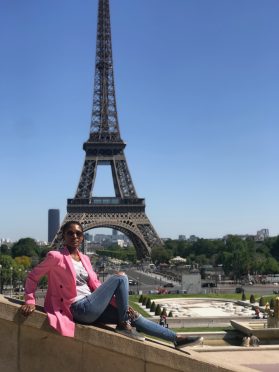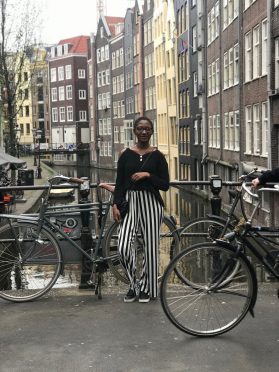I just arrived from an amazing semester exchange at Lund School of Economics and Management in Sweden. I was enrolled at the prestigious department of economic history at Lund University which also happens to be one of the biggest economic history departments in the world! This was a worthwhile and life-changing experience for me both academically and in terms of personal growth. Here are some of my thoughts about this awesome experience.
Pre-departure:
My decision to go to Lund was based on my interest in economic history. As such, applying to go to one of the biggest economic history departments in the world was a suitable fit. Right from the beginning of my application process the international coordinators both at Stellenbosch University and Lund University gave me all the required assistance and provided me with the necessary information. I also did a lot of research about Lund University through their website to help set the expectations of where I was going. The official arrival day for the spring semester was only less than 8 weeks from the time I got accepted. (For those going for the autumn semester you may get your acceptance letter a bit earlier). This meant that I had to apply for the visa and get all the documents ready in a short period which can be a bit overwhelming.
The visa application to Sweden is not complicated at all. You simply submit all the necessary documents online and pay the application fee online. The only hiccup I had was getting my financial documents in one place. The visa office had to email me several times to resubmit the financial documents thus prolonging the application process. Once the financial documents were approved it only took a few days to get the decision about the visa application. (Please note that the Swedish Embassy is only in Pretoria, therefore, you will be asked to fly to their office to get your biometrics). Once your application process is approved the Swedish embassy gives you a temporary resident permit card which takes 4-8 weeks to process. However, there is an option to get a provisional visa that allows you to travel while waiting for the resident permit card. But this visa comes at an additional cost.

The international coordinators will assist you with all the other information even though it is mostly your prerogative to make sure you are on top of things. Lund University website provides enough information and it’s important to also utilize the help of your international coordinator at the host University. My international coordinator from Lund was super helpful making the process very smooth for me. I applied for accommodation online through Lund accommodation and I was offered a studio flat which I liked very much because of its privacy and quietness. (But if you wish to save a bit more money and like living in a shared space then opt for a corridor room instead). To help with my travel plans and flight bookings I asked for the course schedule ahead of time to check the exam dates and timetable. I used the Lund timeedit system which is an online service that shows you the timetable for the courses and important dates.
My experience at Lund University:
I arrived in Lund on the official arrival day. I was welcomed by student mentors at the airport who assisted us to get to campus for arrival day activities after which they drove us to our respective housing areas.
I experienced my first cultural shock that same day when I found out that almost everything in the grocery store was in Swedish. It is very easy to go to a shop and come out with yogurt instead of milk! Google translate will be your help in such times.
Academic Experience:
Lund University offers a selection of courses to its exchange students. I had particular courses that I was interested in at the department on economic history but they were not offered to exchange students. With the help of the international coordinator, I made a separate request to be accepted to these courses. I was registered in four courses:
Institutions, Economic Growth and Equity: This was my absolute favorite course. It included a diverse of readings, seminars and a final paper. It helped me engage with some of the most influential literature in economic history thereby giving me an in-depth knowledge in the field of economic history.
Human capital in Historical Perspective: This is also one of the more advanced courses in economic history offered at the department. The syllabus included a diversity of readings, seminars, a sit-down quiz, and a final paper.
Swedish Economic Development: This is one of the special courses that are specifically offered to exchange students. Apart from learning a lot about Sweden’s economic development from a historical perspective, I also learned a lot about European economic history which is an important part of the syllabus.
Economic Change, Labour Market and the Population: This is also one of the special courses offered to exchange students. This course gave me an in-depth knowledge of economic change particularly in the labor market in the European context.

There are two main differences I noted between the academic systems here at Stellenbosch and Lund University. First, there is a lot of group work in the form of seminars where students are required to discuss and present on a particular subject. For most of the courses, the final course grade is made up of participation in seminars, take-home exams and in some instances a sit-down exam. (If you do not prefer sit–down exams and are more comfortable with take-home exams and seminars then you will fit right in!). The second difference is that the course work is split into two; you only study two courses at a time in each term of the semester.
Travel Experience:
I finished my coursework a month before the time I was meant to return to Stellenbosch. During the time before my departure, I managed to keep busy by working at the department of economic history where I was employed part-time as a research assistant. My sister also came to visit me towards the end of my exchange, and we took a mini Europe tour where we traveled to six countries in six days! This was quite an adventure for both of us.
Return to Stellenbosch:

Leaving Sweden was such a bittersweet moment for me. I had become so fond of living in such a quiet and cozy town. The realization of coming to a cold and rainy winter in Cape Town made leaving the nice spring weather in Lund even more difficult. Coming back home to friends and family has been refreshing but a bit challenging at the same time. I was used to living alone and spent a lot of time by myself, therefore, integrating myself to a larger space of people has been quite overwhelming. But I am glad to be back in Stellenbosch and I am looking forward to finishing my masters.
Finally, I would encourage everyone to go on exchange if they have that opportunity. It is quite an adventure and it helps you grow as an individual in more ways than you can ever imagine. I will always remember Lund as the place I blossomed into a confident version of myself that I have come to love. I came back from Sweden more content and confident in myself and ready to take on the world!

